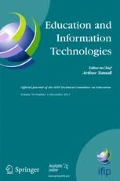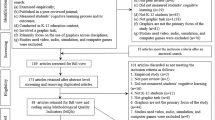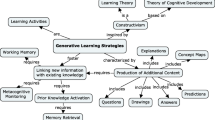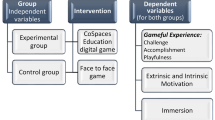Abstract
Purpose of this study is determined effects of different teaching approaches on programming skills. Therefore, the effect of three different types of activities prepared with Scratch on 423 sixth grade students’ attitudes towards computer technologies, algorithmic thinking skills and reflective thinking skills on problem solving were investigated. Three IT teachers at the three schools, were asked to prepare and teach one of the three activities in their computer classes so that a different type of activity was provided at each school. The practical phase was carried out twice a week for seven weeks. A mixed method design was used with quantitative and qualitative components. Results showed that although the same programming tool and similar code blocks were used in the three applications, selected activities resulted in different effects on students. It was found that animation activities of the three types of activities had a positive effect on students’ attitudes towards computer technologies. The mathematical and game preparation activities had positive effects on algorithmic thinking and reflective thinking skills for problem solving. The present study reveals the importance of “activity type,” which is often neglected as a variable in studies investigating the different effects of block-based visual programming tools.





Similar content being viewed by others
References
Arnau, D., Arevalillo-Herraez, M., Puig, L., & Gonzalez-Calero, J. A. (2013). Fundamentals of the design and the operation of an intelligent tutoring system for the learning of the arithmetical and algebraic way of solving word problems. Computers & Education, 63, 119–130. https://doi.org/10.1016/j.compedu.2012.11.020.
Aydoğan, D. (2013). The investigation of levels of realization attainments related to 'environmental awareness' and 'information technology' in primary education curriculum. Malatya: Unpublished Doctorate Dissertation. İnönü University Education Sciences Institute.
Baylor, A. L., & Ritchie, D. (2002). What factors facilitate teacher skill, teacher morale, and perceived student learning in technology-using classrooms? Computers & Education., 39(4), 395–414. https://doi.org/10.1016/S0360-1315(02)00075-1.
Bayrak, F., & Koçak Usluel, Y. (2011). The effect of blogging on reflective thinking skill. Hacettepe Universtiy Journal of Education, 40, 93–104.
Brown, Q., Mongan, W., Kusic, D., Garbarine, E., Fromm, E., & Fontecchio A. (2013). Computer Aided Instruction as a Vehicle for Problem Solving: Scratch Programming Environment in the Middle Years Classroom. from http://www.pages.drexel.edu/~dmk25/ASEE_08.pdf. Accessed 15 June 2018.
Burke, Q., & Kafai, Y. B. (2012). The writers’ workshop for youth programmers. In Proceedings of the 43rdSIGCSE technical symposium on computer science education, (Raleigh, NC February 29–march 03) (pp. 433–438). New York, NY: ACM.
Burton, B. A. (2010). Encouraging algorithmic thinking without a computer. Olympiads in Informatics, 4, 3–14.
Calao, L. A., Moreno-Leon, J., Correa, H. E., & Robles, G. (2015). Developing Mathematical Thinking with Scratch. In Developing mathematical thinking with scratch an experiment with 6th grade students. Design for Teaching and Learning in a Networked World (17–27). Springer International Publishing. https://doi.org/10.1007/978-3-319-24258-3_2.
Calder, N. (2010). Using scratch: An integrated problem solving approach to mathematical thinking. Australian Primary Mathematics Classroom, 15(4), 9–14.
Chang, C. (2014). Effects of using Alice and Scratch in an introductory programming course for corrective instruction. Journal of Educational Computing Research, 51(2), 185–204. https://doi.org/10.2190/EC.51.2.c.
Chang, C. K., & Biswas, G. (2011, June). Design engaging environment to foster computational thinking. In Proceedings of the world conference on educational multimedia, hypermedia and telecommunications (Vol. 1, pp. 2898–2902).
Chen, T., Mdyunus, A., Ali, W. Z. W., & Bakar, A. (2008). Utilization of intelligent tutoring system in mathematics learning. International Journal of Education and Development using Information and Communication Technology, 4(4), 50–63.
Choi, H. (2013). Pre-service teachers’ conceptions and reflections of computer programming using scratch: Technological and pedagogical perspectives. International Journal for Educational Media and Technology, 7(1), 15–25.
Claypool, M. (2013). Dragonfly: Strengthening programming skills by building a game engine from scratch. Computer Science Education, 23(2), 112–137. https://doi.org/10.1080/08993408.2013.781840.
Cohen, J. (1988). Statistical power analysis for the behavioral sciences (2nd ed.). Hillsdale, NJ: L. Erlbaum Associates.
Creswell, J. W. (2003). Research design: Qualitative, quantitative, and mixed methods approaches (2nd ed.). Thousand Oaks, CA: Sage.
Çetin, İ., & Dubinsky, E. (2017). Reflective abstraction in computational thinking. Journal of Mathematical Behavior., 47(2017, 70–80. https://doi.org/10.1016/j.jmathb.2017.06.004.
De Corte, E., & Masui, C. (2004). The CLIA-model: A framework for designing powerful leaming environments for thinking and problem solving. European Journal of Psychology of Education, 19(4), 365–384. https://doi.org/10.1007/BF03173216.
De Oliveria, M. G., Ciarelli, P. M., & Oliveira, E. (2013). Recommendation of programming activities by multi-label classification for a formative assessment of students. Expert Systems with Applications, 40, 6641–6651. https://doi.org/10.1016/j.eswa.2013.06.011.
Demo, G. B., & Williams, L. (2014). The many facets of scratch. In Y. Gülbahar & E. Karataş (Eds.), Informatics in Schools. Teaching and Learning Perspectives. ISSEP 2014. Lecture notes in computer science (Vol. 8730). Cham: Springer.
Dewey, J. (1933). How We Think. A restatement of the relation of reflective thinking to the educative process. Boston: D. C. Heath.
Doğan, U., & Kert, S. B. (2016). Bilgisayar Oyunu Geliştirme Sürecinin, Ortaokul Öğrencilerinin Eleştirel Düşünme Becerilerine ve Algoritma Başarılarına Etkisi. Boğaziçi Üniversitesi Eğitim Dergisi, 33(2), 21–42. ISSN 1300-9567.
Doleck, T., Bazelais, P., Lemay, D. J., Saxena, A., & Basnet, R. B. (2017). Algorithmic thinking, cooperativity, creativity, critical thinking, and problem solving: Exploring the relationship between computational thinking skills and academic performance. J. Comput. Educ., 4(4), 355–369. https://doi.org/10.1007/s40692-017-0090-9.
Epstein, A. S. (2009). “How planning and reflection develop young children’s thinking skills.” from http://www.journal.naeyc.org/btj/200309/Planning&Reflection.pdf. Accessed 26 Aug 2009.
Erümit, A. K., Karal, H., Şahin, G., Aksoy, D. A., Gencan, A. A., & Benzer, A. İ. (2019). A model suggested for programming teaching: Programming in seven steps. Education and Science, 44(197), 155–183. https://doi.org/10.15390/EB.2018.7678.
Fessakis, G., & Serafeim, K. (2009). Influence of the familiarization with scratch on future teachers’ opinions and attitudes about programming and ICT in education. ACM SIGCSE Bulletin, 41(3), 258–262. https://doi.org/10.1145/1595496.1562957.
Fessakis, G., Gouli, E., & Mavroudi, E. (2013). Problem solving by 5–6 years old kindergarten children in a computer programming environment: A case study. Computers & Education, 63, 87–97. https://doi.org/10.1016/j.compedu.2012.11.016.
Futschek, G. (2006). Algorithmic thinking: The key for understanding computer science. In Mittermeir, R.T.(Ed.), ISSEP 2006, LNCS (Vol. 4226, pp. 159–168).
Hayes, J., & Stewart, I. (2016). Comparing the effects of derived relational training and computer coding on intellectual potential in school-age children. British Journal of Educational Psychology, 86(3), 397–411. https://doi.org/10.1111/bjep.12114.
Hernandez, C. C., Silva, L., Segura, R. A., Schimiguel, J., Ledon, M. F. P., Bezerra, L. N. M., & Silveria, I. F. (2010). Teaching programming principles through a game engine. CLEI Electronic Journal, 13(2), 3–11.
Hershkovitz, A., & Karni, O. (2018). Borders of chance: A holistic exploration of teaching in one-to-one computing programs. Computers & Education, 125, 429–443. https://doi.org/10.1016/j.compedu.2018.06.026.
Hoffman, B., & Spatariu, A. (2008). The influence of self-efficacy and metacognitive prompting on math problem solving efficiency. Contemporary Educational Psychology, 33, 875–893. https://doi.org/10.1016/j.cedpsych.2007.07.002.
Hromkovic, J., Kohn, T., Komm, D., & Serafini, G. (2016). Examples of algorithmic thinking in programming education. Olympiads in Informatics, 10, 111–124. https://doi.org/10.15388/ioi.2016.08.
Huang, T. H., Liu, Y. C., & Chang, H. C. (2012). Learning achievement in solving word-based mathematical questions through a computer-assisted learning system. Educational Technology & Society, 15(1), 248–259.
Hwang, G. J., Chen, C. Y., Tsai, P. S., & Tsai, C. C. (2011). An expert system for improving web-based problem solving ability of students. Expert Systems with Applications, 38, 8664–8672. https://doi.org/10.1016/j.eswa.2011.01.072.
Israel, M., Pearson, J. N., Tapia, T., Wherfel, Q. M., & Reese, G. (2015). Supporting all learners in schoole-wide computatitonal thinking: A cross-case qualitative analysis. Computers & Education, 82(2015, 263–279. https://doi.org/10.1016/j.compedu.2014.11.022.
Johnson, R. B., & Onwuegbuzie, A. J. (2004). Mixed methods research: A research paradigm whose time has come. Educational Researcher, 33(7), 14–26. https://doi.org/10.3102/0013189X033007014.
Kafai, Y. B., & Burke, Q. (2015). Constructionist gaming: Understanding the benefits of making games for learning. Educational Psychologist, 50(4), 313–334. https://doi.org/10.1080/00461520.2015.1124022.
Kalelioğlu, F. (2015). A new way of teaching programming skills to K-12 students: Code.org. Computers in Human Behavior, 52, 200–210. https://doi.org/10.1016/j.chb.%202015.05.047.
Kalelioğlu, F., & Gülbahar, Y. (2014). The effects of teaching programming via scratch on problem solving skills: A discussion from learners’ perspective. Informatics in Education, 13(1), 33–50.
Kızılkaya, G., & Aşkar, P. (2009). The development of a reflective thinking skill scale towards problem solving. Education and Science., 34(154), 82–92.
Kobsiripat, W. (2015). Effects of the media to promote scratch programming capabilities creativity of elementary school students. Procedia-Social and Behavioral Sciences, 174, 227–232. https://doi.org/10.1016/j.sbspro.2015.01.651.
Kuhn, D. (1990). Developmental perspectives on teaching and learning thinking skills. New York: Jossey-Bass.
Lai, A., & Yang, S. (2011). The learning effect of visualized programming learning on 6th graders’ problem solving and logical reasoning abilities. International Conference on Electrical and Control Engineering (ICECE), 16–18 Sept. 2011, Yichang, 6940–6944.
Lee, Y. J. (2011). Scratch: Multimedia programming environment for young gifted learners. Gifted Child Today, 34(2), 26–31. https://doi.org/10.1177/107621751103400208.
Loughran, J. (1996). Developing reflective practice: Learning about teaching learning through modelling. London: Falmer Press.
Lye, S. Y., & Koh, J. H. L. (2014). Review on teaching and learning of computational thinking through programming: What is next for K-12? Computers in Human Behavior, 41, 51–61. https://doi.org/10.1016/j.chb.2014.09.012.
Maloney, J., Resnick, M., Rusk, N., Silverman, B., & Eastmond, E. (2010). Scratch programming language and environment. ACM Transactions on Computing Education, 10(4), 1–15. https://doi.org/10.1145/1868358.1868363.
Meerbaum-Salant, O., Armoni, M., & Ben-Ari, M. (2013). Learning computer science concepts with scratch. Computer Science Education, 23(3), 239–264. https://doi.org/10.1080/08993408.2013.832022.
Milkova, E., & Hulkova, A. (2013). Algorithmic and logical thinking development: Base of programming skills. WSEAS Transactions on Computers., 2(12), 41–51.
Mladenović, M., Rosić, M., & Mladenović, S. (2016). Comparing elementary students’ programming success based on programming environment. I.J. Modern Education and Computer Science, 8, 1–10. https://doi.org/10.5815/ijmecs.2016.08.01.
Mohamedi, H., Bensebaa, T., & Trigano, P. (2012). Developing adaptive intelligent tutoring system based on item response theory and metrics. International Journal of Advanced Science and Technology, 43, 1–14.
Navarrete, C. C. (2013). Creative thinking in digital game design and development: A case study. Computers & Education, 69, 320–331. https://doi.org/10.1016/j.compedu.2013.07.025.
Papavlasopoulou, S., Sharma, K., & Giannakos, M. N. (2018). How do you feel about learning to code? Investigating the effect of children’s attitudes towards coding using eye-tracking. International Journal of Child-Computer Interaction, 17, 50–60. https://doi.org/10.1016/j.ijcci.2018.01.004.
Polya, G. (1957). How to solve it? (2nd ed.). Princeton, N.J: Princeton University Press.
Popat, S., & Starkey, L. (2019). Learning to code or coding to learn? A systematic review. Computers & Education, 128, 365–376. https://doi.org/10.1016/j.compedu.2018.10.005.
Quahbi, I., Kaddari, F., Darhmaoui, H., Elachqar, A., & Lahmine, S. (2015). Learning basic programming concepts by creating games with scratch programming environment. Procedia-Social and Behavioral Sciences, 191, 1479–1482. https://doi.org/10.1016/j.sbspro.2015.04.224.
Sáez-López, J. M., Román-González, M., & Vázquez-Cano, E. (2016). Visual programming languages integrated across the curriculum in elementary school: A two year case study using “scratch” in five schools. Computer & Education, 97, 129–141. https://doi.org/10.1016/j.compedu.2016.03.003.
Scaffidi, C., & Chambers, C. (2012). Skill progression demonstrated by users in scratch animation environment. International Journal of Human-Computer Interaction, 28(6), 383–398. https://doi.org/10.1080/10447318.2011.595621.
Stanovich, K. E. (2009). Distinguishing the reflective, algorithmic, and autonomous minds: Is it time for a tri-process theory? In J. S. B. T. Evans & K. Frankish (Eds.), In two minds: Dual processes and beyond (pp. 55–88). New York, NY, US: Oxford University Press.
Tashakkori, A., & Teddlie, C. (1998). Mixed methodology: Combining qualitative and quantitative approaches. Applied social research methods series (Vol.46). Thousand Oaks, CA: Sage.
Theodoraki, A., & Xinogalos, S. (2014). Studying students’ attitudes on using examples of game source code for learning programming. Informatics in Education, 13(2), 265–277. https://doi.org/10.15388/infedu.2014.07.
Turkey Ministry of National Education. (2017). Bilişim teknolojileri ve yazılım dersi öğretim programı, 2016–2017. Ankara: Milli Eğitim Basımevi.
Van Merriënboer, J. J. G. (2013). Perspectives on problem solving and instruction. Computers & Education., 64, 153–160. https://doi.org/10.1016/j.compedu.2012.11.025.
Vicente, S., Orrantia, J., & Verschaffel, L. (2007). Influence of situational and conceptual rewording on word problem solving. British Journal of Educational Psychology, 77(4), 829–848. https://doi.org/10.1348/000709907X178200.
Wagner, T. (2008). The global achievement gap: Why even our best schools don't teach the new survival skills our children need and what we can do about it. Basic Books.
Wilson, A., & Moffatt, D. C. (2010). Evaluating scratch to introduce younger schoolchildren to programming. Paper presented at 22nd annual workshop of the psychology of programming interest group. Leganes: Spain.
Wilson, A., Hainey, T., & Connolly, T. M. (2013). Using scratch with primary school children: An evaluation of games constructed to gauge understanding of programming concepts. International Journal of Game-Based Learning, 3(1), 93–109. https://doi.org/10.4018/ijgbl.2013010107.
Yang, Y.T.C., Chuang Y.C., Li, L.Y., Tseng, S.S. (2013). A blended learning environment for individualized English listening and speaking integrating critical thinking. Computers & Education, 63, 285–305. https://doi.org/10.1016/j.compedu.2012.12.012.
Year, R., & Martinez, L. (2017). A recommendation approach for programming online judges supported by data preprocessing techniques. Applied Intelligence, 47(2), 277–290. https://doi.org/10.1007/s10489-016-0892-x.
Yen, J. C., & Chen, M. P. (2008). Patterns of reflection for problem solving in a mobile learning environment. International Journal of Education and Information Technologies, 2(2), 121–124.
Yildiz Durak, H. (2018). The effects of using different tools in programming teaching of secondary school students on engagement, computational thinking and reflective thinking skills for problem solving. Technology Knowledge and Learning., 2018, 1–17. https://doi.org/10.1007/s10758-018-9391-y.
Yükseltürk, E., & Altıok, S. (2015). Pre-service information technologies teachers’ view on computer programming teaching. Amasya Education Journal, 4(1), 50–65.
Zavala, L. A., Gallardo, S. C., & García-Ruíz, M. Á. (2013). Designing interactive activities within scratch 2.0 for improving abilities to identify numerical sequences. New York: IDC.
Ziatdinov, R., & Musa, S. (2012). Rapid MentalСomputation system as a tool for algorithmic thinking of elementary school students development. European Researcher, 25(7), 1105–1110.
Zsako, L., & Szlavi, P. (2012). ICT competences: Algorithmic thinking. Acta Didactica Napocensia, 5(2), 49–58 ISSN: 2065-1430.
Author information
Authors and Affiliations
Corresponding author
Ethics declarations
The article is the authors’ original work and does not contain any libelous or unlawful statements or infringe on the rights or privacy of others or contain material or instructions that might cause harm or injury.
The authors have received approval by the appropriate Institutional Review Boards for all participating agencies and obtained consent and assent when appropriate. Authors agree to grant exclusive license to publish to Education and Information Technologies.
Conflict of interest
The author has no conflict of interest with any person, institution or company.
Additional information
Publisher’s note
Springer Nature remains neutral with regard to jurisdictional claims in published maps and institutional affiliations.
Rights and permissions
About this article
Cite this article
Erümit, A.K. Effects of different teaching approaches on programming skills. Educ Inf Technol 25, 1013–1037 (2020). https://doi.org/10.1007/s10639-019-10010-8
Received:
Accepted:
Published:
Issue Date:
DOI: https://doi.org/10.1007/s10639-019-10010-8




